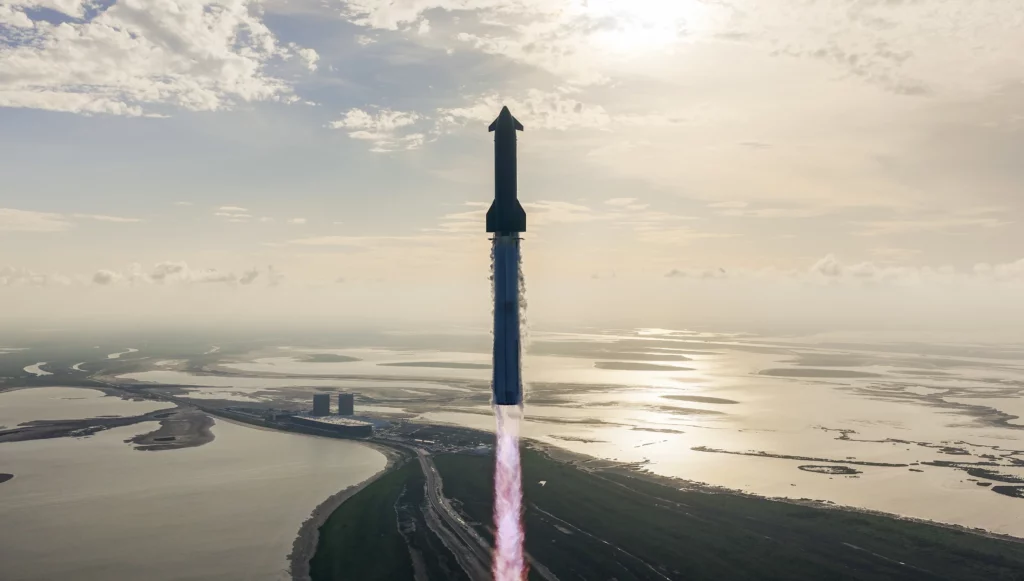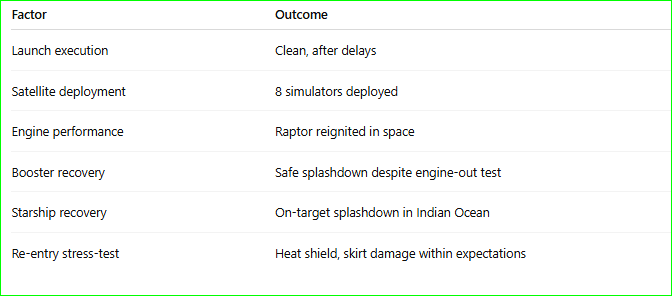SpaceX News: Successfully Tests Giant Mars Rocket with Almost Perfect Launch
- SpaceX’s Starship nailed its 10th test flight, widely praised as a Perfect Launch, with clean liftoff, booster splashdown, and on-target Starship recovery.
- The mission proved payload deployment, Raptor engine reignition, and reusability milestones, strengthening SpaceX’s role in the global space race.
- While heat damage and future reuse challenges remain, this near-flawless test boosts confidence in NASA partnerships, Starlink expansion, and Mars goals.
In a groundbreaking moment for space exploration, SpaceX has delivered what many are calling a Perfect Launch of its giant Mars rocket, the Starship megarocket, on its 10th test flight from Starbase, Texas. This mission marks a near-flawless return to form after a string of previous setbacks and brings space travel one step closer to Mars, the Moon, and beyond.
What Made This Flight Feel Like a Perfect Launch?

SpaceX delivered on nearly every major objective: both the Super Heavy booster and the upper-stage Starship performed exactly as planned.
- The rocket, standing over 400 feet tall, lifted off cleanly on August 26, 2025, after two prior delays caused by ground-system issues and weather.
- It marked the first time Starship deployed eight Starlink satellite simulators, using a unique PEZ-style dispenser mechanism.
- The upper stage even re-ignited its Raptor engine in space, a critical capability for future orbital maneuvers.
- Both stages ended in controlled water landings: Super Heavy splashed down in the Gulf of Mexico; Starship splashed down in the Indian Ocean, on target, captured on a pre-placed buoy.
What Role Does Starship Play in the Global Space Race?
Space is no longer a competition between just the US and Russia. China, India, and private companies are all accelerating their programs. The Perfect Launch of Starship puts SpaceX ahead in this global space race, showing it can achieve what other rockets have not yet matched: full-scale heavy-lift reusability.
If SpaceX succeeds in making Starship operational, it will become the go-to vehicle for launching satellites, building space stations, and sending crews beyond Earth orbit. This adds not just commercial value but also geopolitical influence, as space access is becoming a marker of national power.
Why Is This Such a Big Deal?
What’s so exciting is how SpaceX overcame its recent failures to deliver something that feels… well, perfect. Missing too much heating damage, deploying simulators, engine reignition, clean water landings, it’s all there.
So, what changed?
- Learning fast. SpaceX studied previous disasters; missions 7, 8, and 9 each had failures during re-entry, staging, or satellite deployment, and fixed weak components like pressurization systems and heat-shield tiles.
- Engine-out test. In a deliberate safety test, one booster engine was shut down during descent. The booster still executed its boostback and landing burns successfully.
- Reduced angle of attack. This milder return profile for the booster prevented the breakup seen on test 9.
What Could Go Wrong Next?
Is everything fixed? Not yet.
- Starship’s re-entry did cause damage: tiles were scorched, some aft-skirt structure broke, and the heat took a toll.
- The program still must prove long-term reuse: catching boosters with “Mechazilla” arms, orbital refueling, and achieving daily launches remain steep challenges
- Environmentally, southern Texas faces increasing scrutiny as launches ramp up, with concerns about ecosystems and FAA reviews amid political pressure
How Does this Perfect Launch Impact the Future of Reusable Rockets?
The success of Starship Flight 10 shows how reusable rockets are moving from concept to reality. Unlike traditional expendable rockets that burn up after a single use, Starship aims for rapid reusability, lowering costs for every mission. This Perfect Launch proved that both stages can survive splashdowns, an early step toward catching boosters with launch tower arms and relaunching them quickly.
Reusability matters because it will cut the cost of space travel by up to 90 percent, making missions to the Moon, Mars, and even deep-space science projects more affordable.
What Are People Saying?
On X, excitement flowed in real time:
From SpaceX: “Super Heavy has splashed down in the Gulf.”
From IainRusty: “Today’s SpaceX launch was nothing short of AMAZING.”
Could the Launch Change Space Tourism and Commercial Spaceflight?
Many people think of Mars colonization when they hear about Starship, but there’s another fast-growing market: space tourism. A Perfect Launch like this reassures investors and private customers that safe and reusable rides to orbit could be available within this decade.
Companies are already planning zero-gravity trips, orbital hotels, and lunar flybys. With Starship’s size and capacity, flying over 100 passengers at once may become possible, transforming space tourism into a mainstream industry.
What Does This Mean for NASA and Mars?
With this Perfect Launch, SpaceX enters a new phase:
- The Artemis 3 mission to the Moon (planned for 2027) relies on Starship variants built on this test program.
- For Mars, Elon Musk hopes to send an uncrewed Starship as early as 2026 when Earth and Mars align, but orbital refueling must be proven first.
- The success bolsters investor confidence; SpaceX is rumored to pursue a $400 billion valuation as it scales Starlink deployment and rocket reuse.
Quick Breakdown: Why This Feels Like a Perfect Launch

In Summary
This 10th flight was not absolutely perfect; Starship did take heat damage and structural stress. But compared to prior disasters, the mission was flawless in delivery. It was a Perfect Launch for what matters most: learning, adapting, and moving forward. For the first time, Starship has delivered payload deployment, engine relights, and controlled recoveries. All in one mission.
SpaceX has demonstrated resilience, transparency, and engineering prowess worthy of serious respect. The road to daily launches, lunar landings, and Mars missions is still rugged, but today’s near-ideal flight brings these goals into sharper view.
FAQ’S
The most powerful SpaceX rocket is Starship with the Super Heavy booster, capable of producing about 16.7 million pounds of thrust.
SpaceX sometimes cancels launches due to bad weather, technical issues, or safety checks to ensure mission success.
Yes, Starship Flight 10 was a near-flawless test flight, hailed as a Perfect Launch with all key milestones achieved.
Starship 10 did not explode, unlike earlier flights. It completed its mission with only minor heat shield and skirt damage.
The SpaceX Starship with its Super Heavy booster is officially the most powerful rocket in the world today.
The fastest rocket ever flown is NASA’s Parker Solar Probe, which reached speeds over 430,000 miles per hour.
NASA retired the Space Shuttle program in 2011, shifting to partnerships with companies like SpaceX for crew and cargo launches.
NASA and SpaceX collaborate to reduce costs and speed up missions, including Artemis Moon landings and future Mars projects.
Flight 10 was scrubbed twice before launch due to ground system problems and weather delays, ensuring a safe and clean liftoff.
Disclaimer
This is for informational purposes only and does not constitute financial advice. Always do your research.






